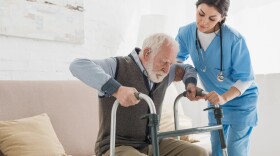-
The Alzheimer's Association also seeks support from legislators for a measure on giving caregivers respite time and funding for its Brain Bus, which travels the state bringing awareness on brain health.
-
Many shots seem to have “off-target” benefits, such as lowering the risk of dementia, studies have found.
-
Paid home care is buckling under the surging demands of an aging population. But there are alternatives that could upgrade jobs and improve patient care.
-
The nonprofit's expansion will also mean additional staff hirings.
-
New research suggests that when emotional intelligence, judgment and experience are combined, many people reach their overall peak in their late 50s to early 60s.
-
People who sign up for Operation Senior Shield receive updates about the latest scams targeting older people, as well as help protecting personal information.
-
The 2026 enrollment period runs from Wednesday to Dec. 7. Most markets will still have several choices, but options are becoming particularly sparse for shoppers with low-income subsidies.
-
The Trump administration has restored promised funds to a program that teaches people in health care how to work with aging Americans. There are 42 grant recipients, including two in Florida.
-
Seniors experiencing cognitive decline are finding help through a program at Stetson University -- an example of what the recent U.S. Pointer study found is beneficial for people at risk of Alzheimer's.
-
Lakshmi Kunta was diagnosed about three years ago, and now at age 77, she is completely reliant on her husband and children to care for her.
-
Overuse of digital gadgets harms teenagers, research suggests. But ubiquitous technology may be helping older Americans stay sharp.
-
Should you get vaccinated? Will your insurer pay for it? And will you still be able to find a vaccine? KFF Health News tries to sort out where things stand.
Play Live Radio
Next Up:
0:00
0:00
Available On Air Stations












